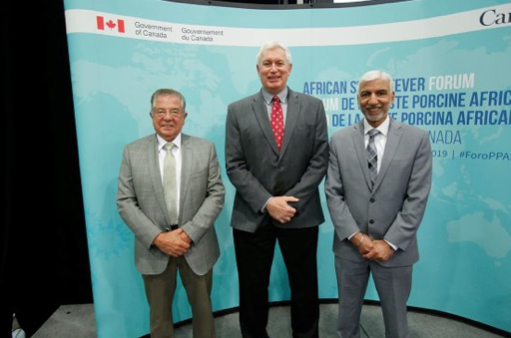| 行业资讯 | 当前位置:首页 > 新闻资讯 > 行业资讯 |
Continent-wide prevention plans are being honed through a newly-formed ‘Americas’ ASF working group, and some trade continuity plans are being put in place in case a breach occurs.
通过一个新成立的“美洲”非瘟(ASF)工作组,整个美洲大陆正在推行预防计划,并实施一些贸易连续性计划,以防疫情爆发。
Aspects of the management and entry prevention of African Swine Fever (ASF) are being tightened around the world, including new plans for more uniform entry prevention (and control if detection should occur) for the Americas.
世界各地正在加强非洲猪瘟的管理和入境预防工作,包括为美洲制定更加统一的入境预防新计划(一旦发现,加以控制)。
Entry prevention actions already taken in ASF-free countries are focussing on preventing meat from being brought in by way of individual airline travellers. For example, in Canada, awareness signs have been posted at airports and social media campaigns have been launched. Officials have applied fines when and where illicit meat has been seized, and the federal government has committed to an expansion of airport ‘sniffer dog’ detection teams.
非瘟疫情安全的国家采取的入境预防行动的重点是防止个人航空旅客携带肉类入境。例如,在加拿大,机场张贴了提高意识的标志,并发起了社交媒体宣传活动。官员们已经对查获非法肉类实施了罚款,联邦政府也承诺扩大机场“嗅探犬”侦查队的规模。

Chief veterinary officers lined up at the ASF Forum held in Ottawa, with (left to right) Dr Juan Gay Gutierrez (Mexico), Dr Jack Shere (USA) and Dr Jaspinder Komal, Food Inspection Agency, Canada). Photo: Treena Hein
出席渥太华ASF论坛的首席兽医官员,左起墨西哥Juan Gay Gutierrez博士、美国Jack Shere博士和加拿大食品检验署Jaspinder Komal博士。照片:Treena Hein
Discussing ASF at meetings across the globe
在全球会议上讨论非瘟
Recently, ASF was discussed at the G20 agriculture ministers meeting in Japan. In addition, more than 150 officials met in Ottawa for a global ASF forum, co-chaired by Canada and the USA.
最近,在日本举行的20国集团农业部长会议上对非洲猪瘟作了讨论。此外,150多名官员在渥太华会晤,参加由加拿大和美国共同主持的全球非瘟论坛。
Delegates attended from China, Mexico, UK, France, Australia, Denmark, New Zealand, Barbados, Dominican Republic, Bolivia, Czech Republic, Japan and Brazil. The United Nations Food and Agriculture Organization (FAO) and the World Animal Health Organization (OIE) also sent representatives.
来自中国、墨西哥、英国、法国、澳大利亚、丹麦、新西兰、巴巴多斯、多米尼加共和国、玻利维亚、捷克共和国、日本和巴西的代表出席了会议。联合国粮农组织(FAO)和世界动物卫生组织(OIE)也派了代表。
ASF plan with 16 focus areas
非瘟防治计划包含16个重点领域
Attendees agreed to a plan with 16 areas of focus. “Jointly, we have developed a framework that will support ongoing international collaboration and action in the areas of preparedness planning, enhanced biosecurity, business continuity and coordinated risk communications,” explained Dr Jaspinder Komal, Canada’s chief veterinary officer (CVO), the OIE delegate for Canada and vice president of the science branch at the Canadian Food Inspection Agency (CFIA).
与会者就一项包括16个重点领域的计划达成一致。加拿大首席兽医官(CVO)、世界动物卫生组织加拿大代表和加拿大食品检验署(CFIA)科学分会副会长 Jaspinder Komal博士解释说,“我们共同开发了一个框架,将有助于进行中的国际合作和行动领域的应急预案、加强生物安全、业务连续性和协调的风险沟通”。
In addition, if ASF is found in Canada, spread of the disease will be prevented through new criteria added to export certificates for live animals, germplasm, animal products and by-products between Canada and the USA and Canada and Europe. This criteria will allow safe trade to continue from disease-free zones.
此外,如果在加拿大发现ASF,将通过在加拿大与美国、加拿大与欧洲之间的活动物、种质、动物产品和副产品出口证书上增加新标准来防止该病的传播。这一标准将使无疾病区的贸易得以安全继续。
Approved disease-free zones
经批准的无病区
If the disease is found in Canada or the USA, Komal (in collaboration with the US CVO, Dr Jack Shere) officially stated on May 22 that safe trade will continue in approved disease-free zones, zones that will be created using parameters first arranged in August 2018 and will be defined at the time of an outbreak according to OIE guidelines.
如果在加拿大或美国发现非瘟,Komal博士(与美国首席价值官Jack Shere博士一起)于5月22日正式声明,安全贸易将继续在经批准的无病区域进行。这些区域将通过2018年8月首次设定的参数以及世界动物卫生组织(OIE)的指导方针划定。
In addition, a new ASF working group for North and South America (‘the Americas’) is currently forming, similar to groups already in place among Asian nations and European nations to address ASF issues. These groups all fall under the the Global Framework for the Progressive Control of Transboundary Animal Diseases (GF-TADs), a joint initiative between FAO and OIE.
此外,目前正在成立一个新的北美洲和南美洲(即“美洲”)非瘟F工作组,类似于亚洲国家和欧洲国家已经成立的处理非瘟的工作组。这些群体都属于粮农组织和世界动物卫生组织共同发起的《逐步控制跨境动物疾病的全球机制》(GF-TADs)。
Sharing strategies and tools to prevent ASF spread
共享防止非瘟传播的策略和工具
CFIA director of animal import & export Dr Mohit Baxi said that once the initiative gets up and running over the next few months, meetings will be held to share strategies and tools to prevent introduction of ASF in the Americas and develop control plans to prevent further spread of the disease if it appears in countries within these continents.
CFIA动物进出口主任Mohit Baxi博士说,一旦该机制开始启动,接下来几个月里,美洲将举办会议,分享防止非瘟进入美洲的策略和工具,并制定控制计划,一旦美洲大陆上有国家暴发疫情,防止疾病进一步传播。
He said, “All 31 countries in North and South America are included in this working group. We will discuss risk communication strategies, surveillance plans and biosecurity protocols so that the appropriate leaders in all countries can all make the right decisions at the right time, and so that countries without a lot of infrastructure can be empowered as much as possible.”
他说:“北美和南美的所有31个国家都在这个工作组中。我们将讨论风险沟通战略、监测计划和生物安全协议,以便所有国家的适当领导人都能在正确的时间做出正确的决定,让缺乏大量基础设施的国家能够获得尽可能多的帮助。”
Dr Baxi said, “ASF is moving worldwide. We need to be on top of prevention and control, and also handle food security issues that may arise.”
Baxi博士说:“非瘟正在全球范围内传播。我们需要在预防和控制方面处于领先地位,并解决可能出现的粮食安全问题。”





